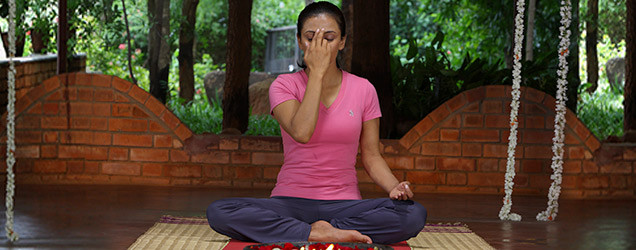Are you having difficulty falling asleep? Do you wake up feeling tired and groggy? Perhaps you’ve noticed that your ability to function effectively is diminished or that you’re feeling irritable a lot of the time. You may be suffering from insomnia. Short-term or transient insomnia is quite common and usually resolves by itself. However, insomnia is considered chronic if it persists beyond a few weeks.
Insomnia, both transient and chronic, can be dealt with meditation.
There is an abundance of evidence that regular meditation can improve sleep patterns, often dramatically. Research indicates that an overly aroused sympathetic nervous system is an important causative factor in chronic insomnia. It states that practices that can reduce nervous system arousal, such as meditation, can be very effective in relieving insomnia.

Our nervous system is usually excessively aroused by several factors. They include stress, tension, overindulgence in stimulants such as tea and coffee, use of drugs, habits like going to bed late, insufficient rest, too much stimulation through TV or computer, and indulgence in dietary habits that don’t suit our constitution. However, generally, insomnia results from mental and emotional stress. Meditation is particularly helpful because it directly relieves the body and mind from stress.

However, these practices are not intended as band-aid solutions for insomnia or any other problem. For insomnia treatment, we recommend undertaking self-study to identify the factors that are the cause of the problem. While you may not be able to change external situations in your life, you can definitely change your reaction to the stress factors. You can also undertake the following tips to deal with insomnia.
1. Practice Sahaj Samadhi meditation

Sahaj Samadhi Meditation is an effortless practice using a primordial sound or mantra. This technique leads to deep states of relaxation and is a wonderful antidote to stress, tension, fatigue, and negative emotional states.
If done for 20 minutes twice a day, morning and afternoon or early evening, it balances the nervous system and provides deeper rest than deep sleep. It is during these periods of deep rest that the body and mind are able to heal itself and reverse the physiological, biochemical, and emotional impact of stress.
If you have not learned it yet, you could find a Sahaj Samadhi Meditation program at an Art of Living center near you.
2. Turn on a guided meditation
Guided meditations can also greatly help in relieving insomnia. Guided meditation CDs are available at The Art of Living Divine Shops. These include Shanti Meditation, Panchakosha Meditation, Om Meditation, and Hari Om Meditation.
You could also do a guided meditation online.
3. Yogic sleep is the way to sound sleep

Yogic sleep (also called as yoga nidra), where we systematically take our awareness to different parts of the body while lying down, is also a great boon to insomnia sufferers. It is particularly helpful if you do it just before sleep. A yoga nidra practice guided by Gurudev Sri Sri Ravi Shankar is available and highly recommended.
Meditation and breathing techniques works in powerful ways to relax and correct your system. Practicing meditation regularly alleviates you from stress-related problems, deeply relaxes the mind and rejuvenates the system. The Art of Living Online Breath and Meditation workshop is a specially crafted program to help you enjoy health and wellness. Learn more >>
Before embarking on a practice, please seek the help of an experienced meditation teacher, who can provide specific advice tailored to your situation.
Try the online guided yoga nidra before you sleep tonight
Check this Interesting read about: the best direction to sleep for a sound sleep
4. This pranayama can help, too

Just before sleep, do a few rounds of Nadi Shodhan pranayama.
- Sit comfortably on your bed and take a few normal breaths. Let your left hand remain on your left thigh with the palm facing the ceiling. Bring your right hand up to your nose.
- Gently rest the index and middle fingers of your right hand above and between the eyebrows. Relax your right shoulder and arm.
- Exhale gently through both nostrils. Now, inhale through the left nostril while blocking your right nostril with your thumb.
- Blocking your left nostril with the ring finger gently, exhale slowly through the right nostril. Now inhale through the right and exhale through the left. This is one round.
- After a couple of rounds, in a very relaxed manner, measure the duration of your inhalation and exhalation. Adjust your breath so that the exhalation is about twice as long as your inhalation.
- To achieve this, you may need to shorten your inhalation rather than lengthening your exhalation. It is important not to strain.
- Let the breath be smooth and comfortably slow. After about five minutes, finish the ongoing round and relax.
- Now, turn your attention to your natural breath. Pay attention to the outgoing breath. As you are aware of the outgoing breath, allow the natural pause to happen at the end of the exhalation.
Don’t deliberately attempt to change the naturally occurring pattern of the breath in any way. Whenever your mind wanders — which it will — gently bring your attention back to exhalation. Don’t try to concentrate or be concerned if your mind continues to remain busy.
Continue with the pranayama for 5 minutes to a maximum of 10 minutes and then relax. Lie down and enjoy the peaceful feeling. You can also use alternate-nostril breathing if you wake up in the middle of the night and can’t get back to sleep.
Summary of tips to alleviate insomnia
- Practice meditation regularly twice a day for about 20 minutes – Sahaj Samadhi Meditation or one of the guided meditations led by Gurudev Sri Sri Ravi Shankar. Seek the guidance of an experienced meditation instructor to determine the practices that would suit you best.
- Practice alternate-nostril breathing with a 1:2 breath ratio and breath observation meditation or Yoga Nidra before sleeping.
- If you wake up in the middle of the night, practice alternate-nostril breathing with a 1:2 breath ratio.
- Consult a meditation expert for any specific advice tailored to your situation.
Make your way to that perfect sound sleep, sweet dreams!
Inspired by Gurudev Sri Sri Ravi Shankar's wisdom talks.
Written by Chris Dale, Faculty, Advanced Meditation Program, The Art of Living.
FAQ's on how to deal with Insomnia
Meditation - A beginner’s Guide Five steps for beginners on how to do meditation: 1. Set your mood for meditation. 2. Sit in a cross-legged position on a yoga mat or chair or lie down on a mattress or yoga mat or bed. 3. Process - Close your eyes and gently bring your attention to your breath. Observe the sound it makes, observe the flow of air entering and leaving your system, notice its temperature. Observe all the thoughts and emotions that run through you. 4. The technique is to take the breath as an anchor to keep our minds in the present moment. 5. Follow the three golden rules of meditation - I want nothing, I will do nothing, I am nothing
Meditation - A beginner’s Guide - A beginner starts from 10 minutes of meditation and gradually increases the duration up to 25 minutes.
Meditation is the process of going inwards. It can happen at any point in time. Meditation is a state of mind. We withdraw from any conscious activity and observe our thoughts and emotions – from a distance. Five steps for beginners on how to do meditation: 1. Set your mood for meditation 2. Sit in a cross-legged position on a yoga mat or chair or lie down on a mattress or yoga mat or bed. 3. Process - Close your eyes and gently bring your attention to your breath. Observe the sound it makes, observe the flow of air entering and leaving your system, notice its temperature. Observe all the thoughts and emotions that run through you. 4. The technique is to take the breath as an anchor to keep our minds in the present moment. 5. Follow the three golden rules of meditation - I want nothing, I will do nothing, I am nothing
A beginner should sit for meditation with three golden rules in mind - I want nothing, I will do nothing, I am nothing.
On meditating every day, we train our minds to get into the habit of staying in the present moment. Peace, happiness, focus, alertness, emotional stability and relaxation are all by-products that blossom on their own with meditation.
First, exercise then, relax for a while and meditate.
1) At the beginning of the meditation, you don’t see anything, you just see emptiness. 2) But when you put your attention there, you start feeling the vibrations. It is called spandana. 3) When you feel some vibrations/sensations, that vibration becomes light.
Meditation has the power to unlock your past impressions of life, anti-ageing property, learn to let go, manage mental health, overcome anxiety & depression, improves focus and memory. For more read - "The benefits of meditation you never knew.
Most meditation experts advise that it is best not to judge your experience at all. There is nothing like “good” meditation or “bad” meditation. Even if you don’t experience any of the signs, it does not mean your meditation was ineffective or not good.
Seven steps of meditation are: 1. Set your mood for meditation. 2. Sit in a cross-legged position on a yoga mat or chair or lie down on a mattress or yoga mat or bed. 3. Process - Close your eyes and gently bring your attention to your breath. Observe the sound it makes, observe the flow of air entering and leaving your system, notice its temperature. Observe all the thoughts and emotions that run through you. 4. The technique is to take the breath as an anchor to keep our minds in the present moment. 5. Follow the three golden rules of meditation - I want nothing, I will do nothing, I am nothing 6. Take attention to different parts of the body one-by-one. 7. Gently open your eyes in your palm when you feel complete.
Start your meditation practice in the following way: 1. Set your mood for meditation 2. Sit in a cross-legged position on a yoga mat or chair or lie down on a mattress or yoga mat or bed. 3. Process - Close your eyes and gently bring your attention to your breath. Observe the sound it makes, observe the flow of air entering and leaving your system, notice its temperature. Observe all the thoughts and emotions that run through you. 4. The technique is to take the breath as an anchor to keep our minds in the present moment.5. Follow the three golden rules of meditation - I want nothing, I will do nothing, I am nothing 6. Take attention to different parts of the body one-by-one. 7. Gently open your eyes in your palm when you feel complete
Panchkosha (body scan) meditation, guided meditation and mantra meditation are the three types of meditation.
